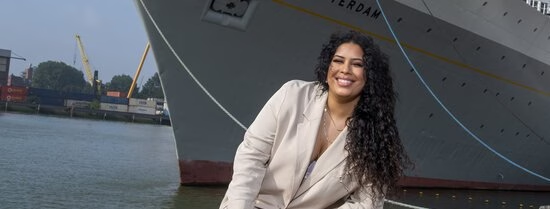As a child, she wanted to become a psychologist. That’s not so strange because Carolina Obispa (28), born in Curaçao, was someone everyone at school turned to for help: “I could really listen well, I understood my classmates and was able to motivate them.” In the end she became a sociologist, although that didn’t just happen: “I went through a really rough patch. But I learned who I am and what I, as a person, can offer others. I want to help those who have few opportunities. People who are told: you’ll never make it.”
Carolina was in a similar position herself in high school. Her home situation meant she didn’t attend many lessons. “I also didn’t have any books, purely because we had no money for that. I borrowed them from classmates so I could secretly copy the teaching material.” And she proved not to be the only one. She later discovered that lots of children on Curaçao were missing out on opportunities because of poverty. Carolina: “Curaçao is my home, but a lot of change is needed.”
Engaging Public Issues
Her Sociology bachelor degree heralded a new era for Carolina. “Rotterdam is multi-cultural. It was in that environment that I learned to be myself, and doing the Engaging Public Issues master degree enhanced this development yet further. I’m a dreamer and someone who likes to do things differently. I was given the space for that in this master degree: I was given guidelines needed to approach issues from a different perspective. The master degree involved the same theory as the bachelor degree but then applied to my interests, which enabled me to discover what I could do with that knowledge.” Carolina considers this insight to be invaluable. For other students, she’s happy to add: “If you think critically and want to change things in the world: do this master!”
Silent violence
Caroline puts lessons from her life and study programme into practice. She took part in projects that make silent violence a topic of discussion, including Consent in the City. This is about street intimidation and safety in Rotterdam. She uses a practical approach in talking to people. “Then you hear the stories behind the city’s unsafe places. It becomes more personal, so you start to make people think about boundaries, about their own behaviour and about the cause of this. Why do I wear my earpods, hold my keys in my hand and look downwards at night? I want to change the discussion from ‘don’t get raped’ to ‘don’t rape’. I can add something with my scientific knowledge.” Carolina prefers to do that with projects on the streets, among people, so she can make her scientific knowledge available to others. “Because the university is place where you’re taught, but it’s actually about who you are outside the campus.”
Dropping anchor
Carolina has established a company, WhatKnow, to address the key question after a protest: ‘What next?’ What do we do after a protest? “I want to translate knowledge so that people understand it, get creative and take action. I’m starting small knowledge centres in various places around the world. This enables me to make space for connections between cultures so that people can learn to see each other without preconceptions. With WhatKnow, I drop anchor where I go and share knowledge that everyone understands. Knowledge that inspires everyone.”
- More information
This interview previously appeared in Spark magazine. This magazine is for students, alumni and partners of ESSB and showcases the positive impact that the faculty's education and research have on society.

